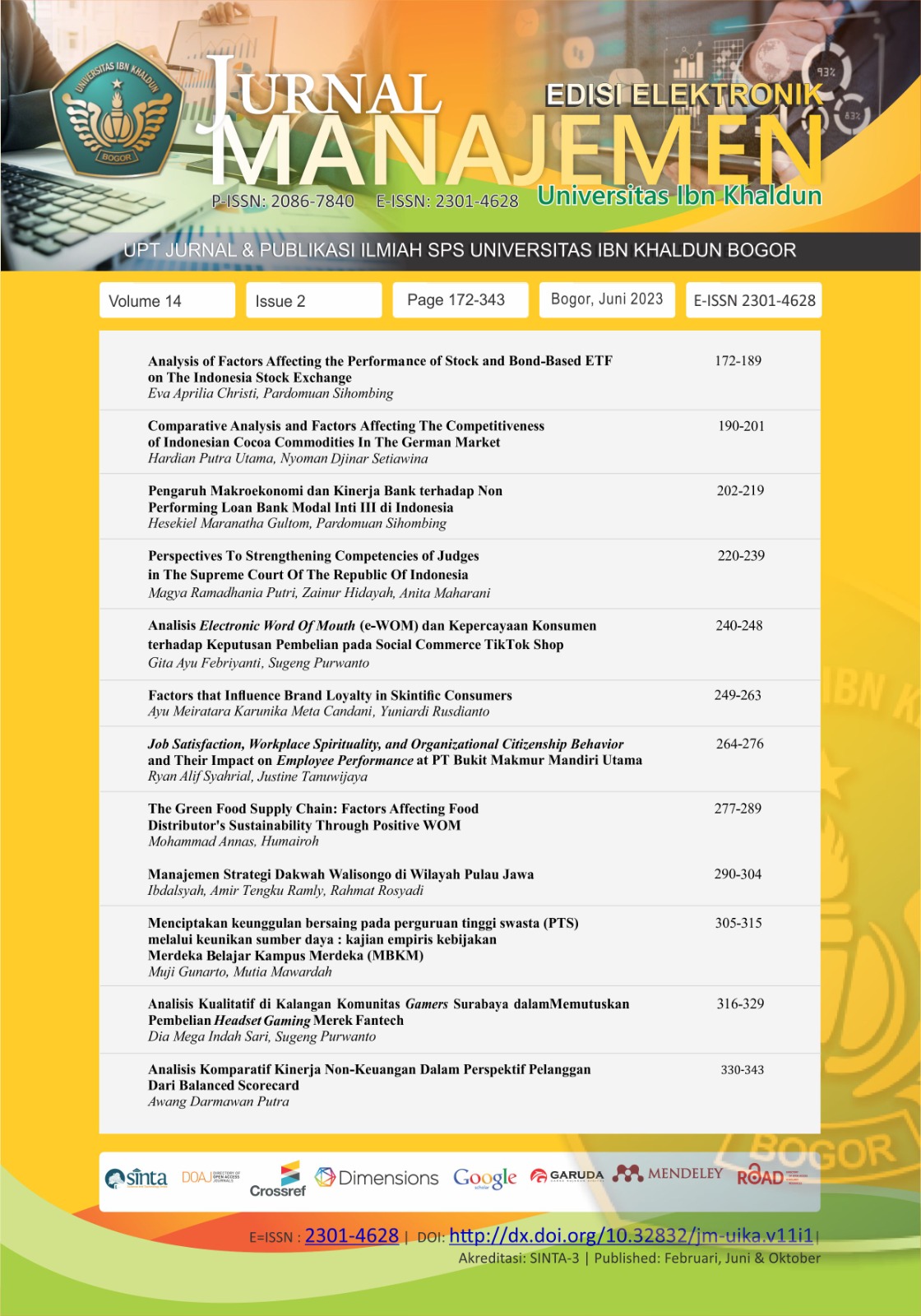Analisis Komparatif Kinerja Non-Keuangan Dalam Perspektif Pelanggan Dari Balanced Scorecard
DOI:
https://doi.org/10.32832/jm-uika.v14i2.11484Keywords:
Kinerja, Non-Keuangan, Pelanggan, Balanced ScorecardAbstract
Menurut Peraturan Menteri Kesehatan Republik Indonesia Nomor 9 Tahun 2014 Tentang Klinik, pelaksanaan kegiatan Puskesmas sebagai BLUD harus mengutamakan efektivitas dan efisiensi serta kualitas pelayanan umum kepada masyarakat tanpa mengutamakan pencarian keuntungan (non-profit). Penelitian ini bertujuan menganalisis komperatif kinerja non keuangan antara Puskesmas Mulyaharja dan Puskesmas Bogor Selatan dalam pespektif pelanggan dari balanced scorecard. Penelitian ini merupakan penelitian kuantitatif metode deskriptif dan komparatif, serta menganalisis kinerja melalui metode balanced scorecard. Penelitian ini menggunakan 2 sampel, yaitu pelanggan/pasien dan pegawai/petugas. Hasil penelitian ini menyatakan bahwa terdapat perbedaan signifikan antara Pelanggan Mulyaharja dan Pelanggan Bogor Selatan. Puskemas Mulyaharja memperoleh skor sebesar 3062, dimana skor ini berada pada interval "Baik” yaitu 2881-4161. Sedangkan Puskesmas Bogor Selatan memperoleh skor sebesar 3390, dimana skor ini berada pada interval "Baik” yaitu 2881-4161.References
Ahmed, Z., Ahmed, Z., Nawaz, M. M., Dost, K. B., & Khan, M. A. (2011). Comparative Significance of the Four Perspectives of Balanced Scorecard. INTERDISCIPLINARY JOURNAL OF CONTEMPORARY RESEARCH IN BUSINESS, 3(1), 981-993.
Albuhisi, A. M., & Abdallah, A. B. (2018). The impact of soft TQM on financial performance: the mediating roles of non-financial balanced scorecard perspectives. International Journal of Quality & Reliability Management. doi:doi.org/10.1108/IJQRM-03-2017-0036
Darmawan, A. (2020). Human Capital Management Dalam Pengembangan Sumber Daya Manusia Pesantren. Jakarta: Rajagrafindo Persada.
Hamali, A. (2016). Pemahaman Manajemen Sumber Daya Manusia. Center for Academic Publishing Servive.
Hamid, N. (2018). Factor analysis for balanced scorecard as measuring competitive advantage of infrastructure assets of owned-state ports in Indonesia: Pelindo IV, Makassar, Indonesia. International Journal of Law and Management, 1-15. doi:https://doi.org/10.1108/IJLMA-12-2016-0178
Mahardika, K., & Supadmi, N. L. (2014). Analisis Komparatif Kinerja Puskesmas Denpasar Selatan dan Denpasar Timur Dengan Menggunakan Metode Balaced Scorecard. E-Jurnal Akuntansi, 8(1), 1-13. Retrieved from https://ojs.unud.ac.id/index.php/akuntansi/article/view/7473
Narkuniene, J., & Ulbinaite, A. (2018). Comparative Analysis of Company Performance Evaluation Methods. The International Journal: Entrepreneurship and Sustaina ISSUES, 6(1), 125-138. doi:http://doi.org/10.9770/jesi.2018.6.1(10)
Purnamasari, L. M. (2016). Analisis Perbandingan Kinerja Non-Keuangan Menggunakan Perspektif Pelanggan Dari Balanced Scorecard. JPAK: Jurnal Pendidikan Akuntansi dan Keuangan, 4(1), 25-35. doi:https://doi.org/10.17509/jpak.v4i1.15415
Sayedi, M. (2016). The Non-Financial and Financial Performance Evaluation of Tax Office Using Balanced Scorecard. International Journal of Business Information Systems, 22(2), 235-258. Retrieved from https://www.inderscienceonline.com/doi/pdf/10.1504/IJBIS.2016.076249
Sugiyono. (2012). Metode Penelitian Kuantitatif Kualitatif dan R&D. CV. Jakarta: Alfabeta.
Tjiptono, F. (2004). Manajemen Jasa. Jakarta: Andi Offset.
Widiyanto, A. (2013). Statistika Terapan. Jakarta: Elex Media Komputindo.
Downloads
Published
How to Cite
Issue
Section
License
Copyright (c) 2023 Jurnal Manajemen (Edisi Elektronik)

This work is licensed under a Creative Commons Attribution-NonCommercial 4.0 International License.
Authors who publish with this journal agree to the following terms:
- Authors retain copyright and grant the journal right of first publication with the work simultaneously licensed under a Creative Commons Attribution-NonCommercial-ShareAlike 4.0 International License that allows others to share the work with an acknowledgement of the work's authorship and initial publication in this journal.
- Authors can enter into separate, additional contractual arrangements for the non-exclusive distribution of the journal's published version of the work (e.g., post it to an institutional repository or publish it in a book), with an acknowledgement of its initial publication in this journal.
- Authors are permitted and encouraged to post their work online (e.g., in institutional repositories or on their website) prior to and during the submission process, as it can lead to productive exchanges, as well as earlier and greater citation of published work (See The Effect of Open Access).











